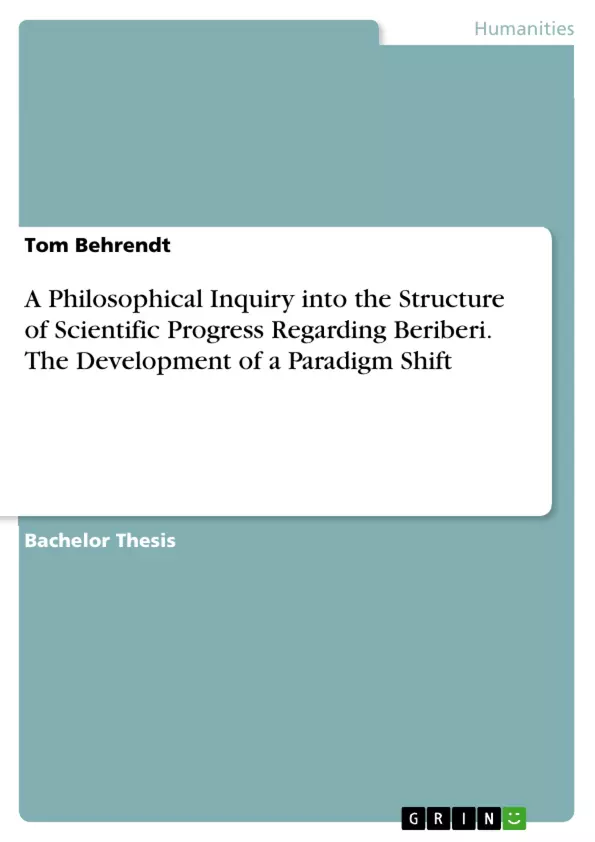This bachelor´s thesis argues for a paradigm shift that emerged as a direct consequence of the gradually developed knowledge regarding the etiology of beriberi.
We are used to the medical and nutritional values of vitamins, we cherish their effectiveness against diseases, or plunge into debates on whether vegans face the risk of running low on B12. What we, however, do not conceive of so much is how the knowledge of vitamins, in the early 20th century, changed the way medical scientists and practitioners theorized disease causation. With the advent of modern microbiology almost every disease was thought to be caused by external agents like bacteria, viruses, or protozoal pathogens. But what if some diseases cannot be explained by such "intrusions"? What if, when, without the "intrusion" of diminutive things the bodily functions will cease? The answer is a gradual transformation of a medical paradigm of disease causation by external factors into a paradigm of internal ones.
Inhaltsverzeichnis (Table of Contents)
- INTRODUCTION
- A DISCOURSE-ANALYSIS OF THE SCIENTIFIC PROGRESS REGARDING BERIBERI
- FROM POSITIVE TO NEGATIVE CAUSATION
- VISUALISATION OF THE REVOLUTIONARY PHASE
- SCIENTIFIC PROGRESS AND THE TRANSITION OF PARADIGM
- MODES OF SCIENTIFIC PROGRESSION
- VALIDATING THE ITERATIVE SCHEMA USING HISTORICAL MATERIAL
- CONCLUSION
Zielsetzung und Themenschwerpunkte (Objectives and Key Themes)
This thesis aims to investigate the scientific progress regarding the etiology of beriberi, a disease prevalent in tropical zones at the turn of the 20th century, using Thomas S. Kuhn's framework of paradigms and scientific revolutions. The research analyzes the transition from a paradigm that attributed disease causation to external factors, such as germs or toxins, to a new paradigm that recognized internal factors, specifically vitamin deficiencies, as the primary cause of beriberi.
- Paradigm Shift in Medical Science
- Role of Scientific Discourse in Shaping Knowledge
- Interplay of Cumulative and Discontinuous Processes in Scientific Progress
- Impact of Anomalies and Crises on Scientific Revolutions
- Evolution of Understanding Beriberi's Etiology
Zusammenfassung der Kapitel (Chapter Summaries)
The first chapter introduces the historical context of beriberi and its perplexing etiology, attributing the disease to various factors like infection, food deficiency, and atmospheric conditions. It then lays the groundwork for the thesis by introducing Kuhn's concept of paradigms and scientific revolutions, highlighting the importance of anomaly recognition and paradigm shift in scientific progress.
The second chapter delves into a discourse analysis of the scientific progress regarding beriberi from 1900 to 1920. This analysis identifies five "observational shifts" marked by methodological changes in investigations, leading to a gradual shift from the initial paradigm of external factors to a new understanding of vitamin deficiency as the primary cause. The chapter meticulously details each observational shift, tracing the evolution of theories, factors, and terminology within the scientific discourse, particularly focusing on the influence of rice and its different forms, the concept of susceptibility, and the gradual identification and understanding of vitamins.
The third chapter builds upon the historical analysis by proposing a model to describe the structure of the paradigm shift, reconciling the processes of cumulation and discontinuity in scientific progress. The chapter examines how these processes interact within a phase of crisis, leading to the emergence of a new paradigm. It then uses the historical data from the discourse analysis to validate the proposed iterative model, demonstrating how the five observational shifts illustrate the paralleling of cumulative and discontinuous processes in the transition from one paradigm to another.
Schlüsselwörter (Keywords)
The key focus topics of this thesis include scientific progress, paradigm shift, beriberi, vitamin deficiency, scientific discourse analysis, Thomas Kuhn, observational shifts, cumulation, discontinuity, iterative progression, and epistemic knowledge.
Frequently Asked Questions
What is the "paradigm shift" regarding Beriberi?
It describes the transition from viewing Beriberi as an infectious disease caused by external germs to recognizing it as a nutritional deficiency (vitamin B1).
How does Thomas Kuhn's framework apply to this study?
The thesis uses Kuhn's concepts of "normal science," "anomalies," and "scientific revolutions" to explain how the medical community accepted the new etiology of Beriberi.
What role did rice play in the discovery of Beriberi's cause?
Researchers observed that consumption of polished rice led to the disease, while unpolished rice (containing the husk) prevented it, leading to the identification of vitamins.
What are "observational shifts" in scientific progress?
These are methodological changes in investigations that gradually lead scientists away from an old paradigm toward a new understanding during a crisis phase.
Why was the germ theory so dominant initially?
In the early 20th century, modern microbiology was so successful that scientists expected almost every disease to be caused by external pathogens like bacteria.
- Citation du texte
- Tom Behrendt (Auteur), 2020, A Philosophical Inquiry into the Structure of Scientific Progress Regarding Beriberi. The Development of a Paradigm Shift, Munich, GRIN Verlag, https://www.grin.com/document/1005545



